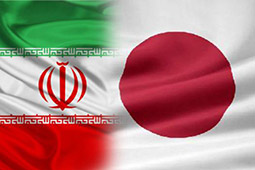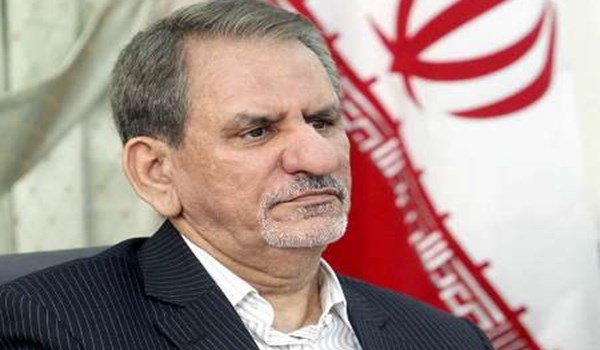
Iran Offers Support to Japanese Business Partners


Iran stands ready to address the concerns of Japanese companies willing to continue business with the country, even as the United States presses its allies to get tough on Iran and to stop importing its oil, Jahangiri said on Thursday in an interview with Kyodo News.
“We are ready to negotiate with Japanese companies who are interested to continue their business in Iran for reaching new solutions in order to ease their concerns,” he underlined.
“The Japanese government and companies have always had their own ways to pass US pressures and we hope again they use their initiatives to stay as a major oil importer from Iran,” the Iranian senior official added.
Japan is among eight nations that received six-month exemptions from U.S. sanctions on importing Iranian oil, which went into effect on Nov. 4, to give them more time to reduce their imports to zero.
Jahangiri said although Iran-Japan economic ties are currently affected by U.S. pressure, the two countries have long had good relations and Iran looks forward to a state visit by Japanese Prime Minister Shinzo Abe, for which it does “not see any obstacle”.
“Anytime he is willing to pay a visit to Iran, Tehran is ready to welcome and host him,” he added.
Jahangiri praised Japan's stand in supporting global peace after World War II, but called it to use its power and influence to put an end to “US unilateralism” in the world.
“Japan must stand against US unilateralism, which is threatening independent countries and might go beyond Iran's nuclear issue to encompass other issues around the globe,” he said.
Regarding the impact of US sanctions on Iran's oil exports, the vice president said it has “found new customers and sold our oil to them”.
While he did not reveal the identity of the “new customers”, he said his government has started “serious negotiations” for selling more oil to Russia and to China and other Asian countries, for example.
Jahangiri anticipated that Iran could restore its oil exports to the level of before Nov. 4 even after expiration of the six-month waivers.
He called the stated US goal of getting all the nations to reduce their imports of Iranian oil to zero “very dangerous”, but at the same time “very unlikely”.
“I assure the world that if Iran would be deprived of its main source of income, we would not be silent and will take appropriate measure in the right time.”
Under a 2015 deal struck between Iran and six major powers -- Britain, China, France, Germany, Russia and the United States -- Tehran agreed to curb its nuclear activities in exchange for the lifting of crippling economic sanctions.
On May 8, US President Donald Trump withdrew the United States from the accord struck under his predecessor Barack Obama and pledged “the highest level of economic sanction” against Iran, calling it “the leading state sponsor of terror”.
Earlier in mid-October, Iranian ambassador said that the bilateral relations between Tehran and Tokyo are supported by both nations.
The Iranian diplomat made the remarks while receiving a host of Japanese journalists, reporters, media people and TV personnel in the building of Iranian embassy in Tokyo. The media people along with managers of some Japanese TV and radio stations were visiting the embassy.
He asserted that friendly relations between Iran and Japan are deep rooted and that is why the ties between the two countries easily win the approval and support of both nations and cultures.
Next year will be coincided with the 90th anniversary of establishment of political and diplomatic relations between Iran and Japan which is a very good opportunity to broaden scientific, cultural and tourism cooperation, Sarmadi said.
To mark the occasion, both sides have prepared various programs which will be covered by Japanese media leading to deepening of cultural ties between the two ancient civilizations, he said.
Appreciating the presence of Japanese media in Iran's embassy, the Iranian ambassador suggested holding regular sessions in the future to work out a framework for regular cooperation between Japanese media and Iranian Embassy and their Iranian counterparts.
In the meeting, the Japanese media voiced readiness to expand cooperation with Iran's embassy to help promote cultural cooperation.
On Saturday, A senior Japanese lawmaker, in a meeting with Rahmani Movahed, voiced his country’s willingness to broaden mutual cooperation and interaction with Iran's parliament within the framework of Tehran-Tokyo diplomatic norms.
Chairman of the Committee on Foreign Affairs at Japan’s House of Representatives Kenji Wakamiya highlighted the impact of parliamentary cooperation on developing relations between the two countries.
"On behalf of Japan’s House of Representatives we want to strengthen ties with Iran in the light of the 90th anniversary of diplomatic ties between Iran and Japan next year.
The Iranian ambassador, for his part, pointed out his recent meetings with a number of senior Japanese officials, and underscored the role of the two countries’ parliaments on expansion of ties between the two sides.
In relevant remarks earlier this month, President of Japan's upper house, the House of Councilors, Chuichi Date, underlined the need for closer cooperation with Iran, extending an invitation to Iranian Parliament Speaker Ali Larijani for an official visit.
The Japanese top parliamentarian made the remarks in a meeting with Rahmani Movahed.
During the meeting, the Japanese politician noted the meetings between the leaders of the two countries in the last six years, stressing that parliament could play an effective role in expanding bilateral cooperation between Tehran and Tokyo.
He also noted the 90th anniversary of diplomatic relations between Iran and Japan next year, expressing hope that important steps would be taken to further strengthen ties.
He then extended an invitation to Iranian Parliament Speaker Ali Larijani, voicing hope that his visit to Japan would further develop relations between the two sides.


Trump weighs using $2 billion in CHIPS Act funding for critical minerals

Codelco cuts 2025 copper forecast after El Teniente mine collapse

Electra converts debt, launches $30M raise to jumpstart stalled cobalt refinery

Barrick’s Reko Diq in line for $410M ADB backing

Abcourt readies Sleeping Giant mill to pour first gold since 2014

Nevada army depot to serve as base for first US strategic minerals stockpile

SQM boosts lithium supply plans as prices flick higher

Viridis unveils 200Mt initial reserve for Brazil rare earth project

Tailings could meet much of US critical mineral demand – study

Kyrgyzstan kicks off underground gold mining at Kumtor

Kyrgyzstan kicks off underground gold mining at Kumtor

KoBold Metals granted lithium exploration rights in Congo

Freeport Indonesia to wrap up Gresik plant repairs by early September

Energy Fuels soars on Vulcan Elements partnership

Northern Dynasty sticks to proposal in battle to lift Pebble mine veto

Giustra-backed mining firm teams up with informal miners in Colombia

Critical Metals signs agreement to supply rare earth to US government-funded facility

China extends rare earth controls to imported material

Galan Lithium proceeds with $13M financing for Argentina project

Kyrgyzstan kicks off underground gold mining at Kumtor

Freeport Indonesia to wrap up Gresik plant repairs by early September

Energy Fuels soars on Vulcan Elements partnership

Northern Dynasty sticks to proposal in battle to lift Pebble mine veto

Giustra-backed mining firm teams up with informal miners in Colombia

Critical Metals signs agreement to supply rare earth to US government-funded facility

China extends rare earth controls to imported material

Galan Lithium proceeds with $13M financing for Argentina project

Silver price touches $39 as market weighs rate cut outlook

















